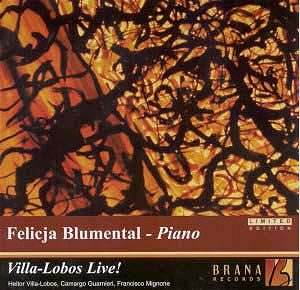Villa-Lobos and Blumental buffs will need no second
bidding to add this disc to their collections. It contains some exceedingly
rare recordings.
I am indebted to Brana's notes for the following information.
Blumental was born in Warsaw on 28 December 1908 studying composition
with Szymanowski. She emigrated to Brazil in 1942 and there toured extensively.
She is the dedicatee of the Villa-Lobos Fifth Piano Concerto which the
composer wrote for her after hearing her performing the Bachianas
Brasileiras No. 3 in São Paulo in 1954. The Fifth Concerto
was premiered by her at the Royal Festival Hall, London on 8 May 1955.
The live performance here took place just a over a fortnight later.
For the recording studio her fach was the work of the early romantics
such as Ries, Czerny, Paisiello, Viotti, Field, Kozeluch, Hummel and
Clementi. She died in Tel Aviv on 31 December 1991. In 1999 the Tel Aviv
Museum of Arts named its International Music Festival after her.
The recording of the Bachianas Brasileiras No. 3
shows signs of blasting distortion. There is some rather stilted
brass playing from the Filharmonia Triestina. Some of the motor rhythms
of the work denote a nationalism absent from the piano concerto. The
Aria [1.43] sounds rather like a cross between de Falla’s Generalife
and the famous variation from the Paganini Rhapsody. There is
also some end of side distortion in the toccata finale.
The rare recording of the Piano Concerto No. 5 is from
a concert that took place at the Musikverein. The sound is clean and
without waver. There are coughs and the strings are pretty thin but
the woodwind sound well enough. This is not a thing of audio splendour
but its preservation of one of Blumental's earliest performances of
the work is of high documentary value. The work itself is rather old-fashioned
aping Rachmaninov and Tchaikovsky with nary a sign of Brazilian local
colour. though the composer's obsession with Bach is touched on in the
poco adagio. It is, overall, a pretty diffuse work if entertaining
enough.
On the evidence of the low whiskery burble, the Garibaldi
piece must be from a 78. It is part nocturne and part music-hall song.
The Dança do indio Branco is volcanically eruptive and
very tense. It compares very favourably with the mundanity of the Garibaldi
piece. Guarnieri’s Dança Brasileira is a little charmer.
The Mignone is a humorous ballet scene.
I am not clear on the point but it seems that these
recordings of solo piano pieces were made at the Anglo-Brazilian Society
concert in London on 15 November 1949.
I am not sure who designed these sleeves but they look
superb and deserve an industry award for combining eye-catching attraction
with legibility.
This disc represents a must for piano fanciers everywhere
and its charms are intensified by the juxtaposition of two works that
are inextricably associated with Blumental.
Rob Barnett


